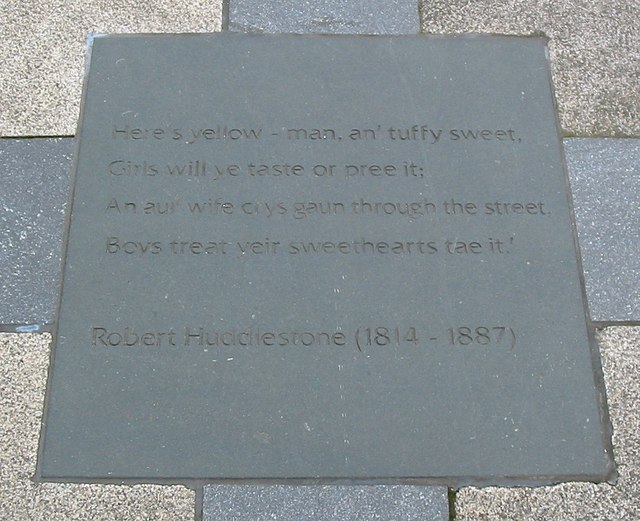Ulster Scots or Ulster-Scots, also known as Ulster Scotch and Ullans, is the dialect of Scots spoken in parts of Ulster in Northern Ireland and the Republic of Ireland. It is generally considered a dialect or group of dialects of Scots, although groups such as the Ulster-Scots Language Society and Ulster-Scots Academy consider it a language in its own right, and the Ulster-Scots Agency and former Department of Culture, Arts and Leisure have used the term Ulster-Scots language.
A bilingual street sign in Ballyhalbert, County Down
Middle Scots inscription "Godis Providens Is My Inheritans" over the main entrance door leading to the tower in Ballygally Castle
Poetry by Robert Huddlestone (1814–1887) inscribed in paving in Writers' Square, Belfast
A sign for the Northern Ireland Department of Culture, Arts and Leisure. It shows the Irish translation (middle) and a translation in a form of Ulster Scots (bottom).
Scots is an Anglic language variety in the West Germanic language family, spoken in Scotland and parts of Ulster in the north of Ireland. Most commonly spoken in the Scottish Lowlands, Northern Isles, and northern Ulster, it is sometimes called Lowland Scots to distinguish it from Scottish Gaelic, the Goidelic Celtic language that was historically restricted to most of the Scottish Highlands, the Hebrides, and Galloway after the sixteenth century; or Broad Scots to distinguish it from Scottish Standard English. Modern Scots is a sister language of Modern English, as the two diverged independently from the same source: Early Middle English (1100–1300).
Statue of Robert Burns in Canberra, Australia
Lufe God abufe al and yi nychtbour as yi self ("Love God above all and thy neighbour as thyself"), an example of Early Scots, on John Knox House, Edinburgh
William Wye Smith's The New Testament in Braid Scots







